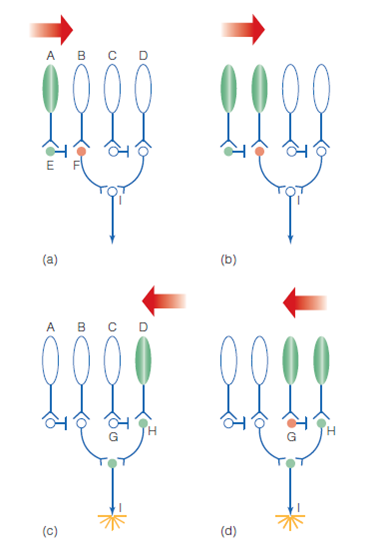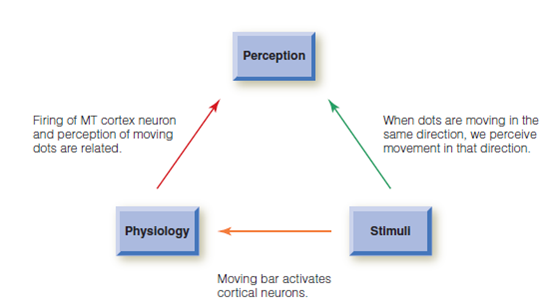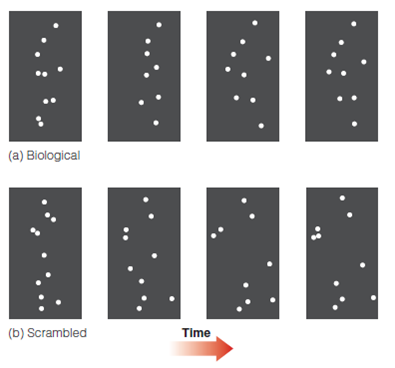
Sensation and Perception 9th Edition by Bruce Goldstein
Edition 9ISBN: 978-1133958475
Sensation and Perception 9th Edition by Bruce Goldstein
Edition 9ISBN: 978-1133958475 Exercise 2
In the present chapter we have described a number of principles that also hold for object perception. Find examples from Chapter of the following (page numbers are for this chapter).
? There are neurons that are specialized to respond to specific stimuli.
? There are parallels between physiology and perception.
? More complex stimuli are processed in higher areas of the cortex.
? Experience can affect perception.
Figure 1
Reichardt circuit. Green indicates excitation; orange indicates inhibition. (a) and (b) When the receptors are stimulated from left to right, neuron I does not fire. (c) and (d) When the receptors are stimulated from right to left, neuron I fires.

Figure 2
The perceptual cycle from Chapter 1. Newsome measured the physiology-perception relationship by simultaneously recording from neurons and measuring the monkey's behavioral response. Other research we have discussed, such as Hubel and Wiesel's receptive field studies, have measured the stimulus-physiology relationship.

Figure 3
Frames from the stimuli used by Grossman and Blake (2001). (a) Sequence from the point-light walker stimulus. (b) Sequence from the scrambled point-light stimulus. From Grossman, E. D., Blake, R. (2001). Brain activity evoked by inverted and imagined biological motion. Vision Research, 41, 1475-1482. With permission from Elsevier.

? There are neurons that are specialized to respond to specific stimuli.
? There are parallels between physiology and perception.
? More complex stimuli are processed in higher areas of the cortex.
? Experience can affect perception.
Figure 1
Reichardt circuit. Green indicates excitation; orange indicates inhibition. (a) and (b) When the receptors are stimulated from left to right, neuron I does not fire. (c) and (d) When the receptors are stimulated from right to left, neuron I fires.

Figure 2
The perceptual cycle from Chapter 1. Newsome measured the physiology-perception relationship by simultaneously recording from neurons and measuring the monkey's behavioral response. Other research we have discussed, such as Hubel and Wiesel's receptive field studies, have measured the stimulus-physiology relationship.

Figure 3
Frames from the stimuli used by Grossman and Blake (2001). (a) Sequence from the point-light walker stimulus. (b) Sequence from the scrambled point-light stimulus. From Grossman, E. D., Blake, R. (2001). Brain activity evoked by inverted and imagined biological motion. Vision Research, 41, 1475-1482. With permission from Elsevier.

Explanation
Object perception means to perceive the ...
Sensation and Perception 9th Edition by Bruce Goldstein
Why don’t you like this exercise?
Other Minimum 8 character and maximum 255 character
Character 255


